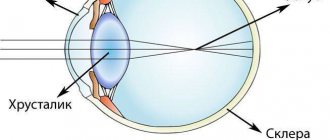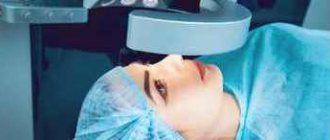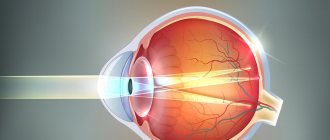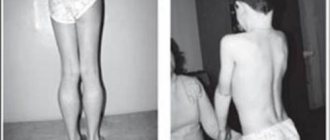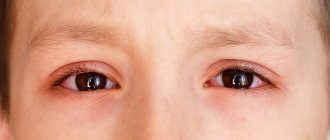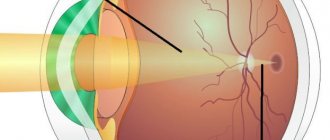Laser correction is the choice of most people who have vision problems. This method restores normal visual function, allows you to lead an active life, engage in various sports and, with the right approach, forget about glasses forever. Read on to find out at what age you can have laser vision correction, and what general features this procedure has.
Excimer laser correction has a minimum of contraindications, but it is best done at the age of 18-45 years. This does not mean that operations are not performed earlier or later - simply that in the specified age range, doctors can guarantee optimal results and a quick recovery. In children under 18 years of age, intervention is indicated in exceptional cases - when laser correction is the optimal solution to the problem. The fact is that while the body is developing, visual function is actively developing. Today the doctor corrected the teenager’s vision, but tomorrow it is very likely to fall again. We will tell you more about the age at which laser vision correction can be performed, as well as the advantages and intricacies of the operation in this article.
Features of the technique
Laser correction of visual impairment is a relatively new, but already popular, method of treating various ophthalmological disorders. It is classified as surgical, since we are talking about the effect on the cornea of the eye. Laser correction has many advantages - high speed of intervention, safety, and quick rehabilitation. Only an ophthalmologist can prescribe it after conducting basic examinations and diagnosing contraindications.
Myopia
Most often, vision correction with a laser light beam is carried out specifically for myopia. Only a doctor can talk about its safety for a particular patient. The main point of the intervention is to influence the corneal structure with a laser beam, and the shape of the cornea will change forever. It is difficult to guarantee 100% safety of this process; there are risks of complications (including after a long time).
Laser correction also cannot guarantee a complete refusal of glasses - sometimes visual function is restored completely, and sometimes only partially. It is important to choose a good clinic and a trusted doctor, since in this case a lot really depends on the skill and equipment used.
Interventions to correct changes down to -10 diopters work best. The acceptable range is from -1 to -10 diopters.
Farsightedness and other visual impairments
For farsightedness, this method can also be used. First, the doctor examines the retina, the bottom of the eye, the corneal part, then says whether such an operation is possible and indicated specifically in your case. Laser correction can also be carried out for other disorders - it is not for nothing that it is classified as a universal technique. Reviews about this type of intervention are mostly good, although there are also negative assessments.
Does it depend on age?
The age for manipulation depends on the person’s goal and disease. There are basically three motivations for laser correction. These are medical indications, cosmetic indications and dream fulfillment.
Article on the topic Pediatric ophthalmologist: “It is important to identify myopia in time.” I remember very well my patient, a ten-year-old gymnast girl. She wanted to become an Olympic champion like Margarita Mamun, but poor eyesight prevented her from catching objects. I also remember a guy who wanted to serve in the Ministry of Internal Affairs, but could not pass a medical examination with a diagnosis of myopia. Now, after laser correction, they are successfully doing their favorite thing.
When we talk about cosmetic indications, we mean that a person does not want to wear glasses and contact lenses. Now that every third student graduates from school with glasses, their classmates probably no longer call them “bespectacled,” but nevertheless, we often encounter a situation where a teenager hides vision problems from his parents so that he is not forced to wear glasses. And the issue of external attractiveness at this age and later comes to the fore. In addition, young people now lead a very active lifestyle. Today the world provides unlimited opportunities, and sometimes “prosthetics” in the form of glasses and lenses prevent you from fully enjoying them. Healthy lifestyle, beauty, healthy appearance are in trend. And glasses don’t really fit in with this trend.
But, by the way, those for whom glasses are important for their image sometimes also undergo laser correction and continue to wear glasses without diopters. And they did laser correction so that they could freely engage in their favorite sports, diving, alpine skiing, and parachute jumping.
And thirdly, these are medical indications. Most often we are talking about such a common eye disease as astigmatism. With such a disease, a person may be ready to wear glasses or contacts, but they can be difficult to find, or even intolerance occurs. And then laser correction is the only possible way to get rid of astigmatism.
But let's get back to age. Let's take children's age, 9-10 years. Is it possible to do laser correction? Yes, because we are talking about medical indications here. A child with farsightedness and astigmatism can already be relieved of glasses at this age.
Article on the topic
Very sharp eye. How to recognize vision problems and how to deal with them? Is it possible to correct myopia for a child of this age? Absolutely not. Myopia should not increase for 3 years. But for congenital myopia, laser correction is quite possible.
20-35 years old. There are practically no restrictions. The most active age, the period when you want to get the most out of the world. At this time, you can finally part with myopia, farsightedness, and astigmatism.
Currently, we also perform such operations on older patients who do not want to wear glasses. Thus, the famous actress Salma Hayek admits that her age affected her eyes most of all. “And I’m not talking about wrinkles: as I’ve gotten older, my eyesight has gotten worse,” she says. — I can't read without glasses anymore. That's just terrible. Much worse than menopause."
Advantages and disadvantages of laser vision correction
During laser correction, local anesthesia is administered - not as painful in terms of consequences and recovery as general. The procedure itself also takes a little time - about 15 minutes. The results are also high - no other therapeutic method allows patients to immediately forget about glasses (but we remind you that no one will give you a guarantee of this even with laser correction).
Minuses:
- High risks of complications;
- Lack of evidence that the achieved vision indicators will be maintained for 10 years, and that visual function will generally be restored;
- High cost of intervention;
- Presence of contraindications, age restrictions.
What is laser vision correction?
Note! There are several methods of laser correction, and each of them has its own indications and allows you to eliminate refractive errors of varying degrees.
Today this is one of the most effective ways to quickly eliminate such a problem, especially if it is steadily progressing.
All existing based on one principle - the treatment of corneal tissue , which is divided into several stages :
- The surface of the cornea is incised using an ophthalmic microkeratome device (in some cases, a laser). As a result, a flap is formed, which is connected to the main part of the corneal layer with a small fragment. Next, this flap is moved to the side or folded back like a lid.
- The main stage of the operation is changing the shape of the cornea using a laser . The characteristics of the newly created cornea shape are pre-calculated by a computer. As a result, such an element of the eye acquires new refractive properties and the patient’s clarity of vision improves. In severe cases, vision restoration is incomplete.
- At the end of the procedure, the retracted corneal flap is returned to its place . And subsequently, during the rehabilitation period, its engraftment occurs, after which there are no scars or sutures left on the cornea.
The procedure is performed under local anesthesia and in the absence of increased sensitivity of the eye tissue, the patient does not feel pain.
At what age do corrections begin and until when?
Age restrictions are the main ones for laser intervention. The procedure is not recommended for persons under 18 years of age, although some doctors say that such conventions can be neglected. In any case, the young patient and his parents must understand that during the active formation of visual function, the results of correction are often the most unstable.
After 45 years, surgery can be done, but you need to understand that the body recovers slowly, and the prognosis may not be the best.
Age-related farsightedness cannot be corrected by laser.
Features of rehabilitation
The patient stays in the clinic for a couple of hours after the operation, then the doctor examines him, writes out a conclusion, gives recommendations on care and lifestyle, and sends him home. Additionally, topical gels and antibiotic drops may be prescribed.
You will need to rest for 5 days and carry out the treatment prescribed by your doctor, then come for a consultation and examination.
Complete healing on average requires a couple of weeks, but this indicator is still individual - much depends on the characteristics of the individual patient.
From drops, doctors usually prescribe Systane and Tobradex. Do not self-medicate - your doctor should choose the drug for you. Do the instillation very carefully, with clean hands, and do not touch the eye with the tip of the pipette. The drops should fall into the hollow between the skin of the eyelids and the apple of the eye. After the procedure, the eyes are closed so that the medicinal substance is distributed evenly.
Recommendations for the recovery period
- The first night the child should sleep on his back, and he should not touch his eyes with his hands (wipe tears from his cheeks with sterile wipes).
- For the first 5 days, do not wash your face with unboiled water.
- Use eye drops only when prescribed by a doctor.
- Eyes should not be covered with bandages or sealed with adhesive tape.
- It is necessary to refrain from sports activities.
- You cannot swim in the pool, open reservoirs, or visit baths and saunas.
Mandatory visits to the eye clinic on control days are important for successful postoperative rehabilitation.
Special gymnastics for the eyes is recommended. For intensive vision restoration, ophthalmologists develop individual rehabilitation complexes for each patient. Teenagers can easily tolerate laser sessions. After the operation, there is a significant improvement in vision. But for a complete recovery, it will take a few more days for the child to adapt to large changes in visual capabilities. During the recovery period, parents must follow all the doctor’s recommendations. During rehabilitation, clinic specialists carefully monitor the process of vision restoration, taking into account the individual characteristics of the patient.
Laser after 50 years: what you need to know
At an advanced age, doctors do not recommend laser correction, but there are cases when the potential benefits from it outweigh the possible harm. The layer of the cornea in older patients is thin, healing is usually slow and accompanied by complications.
Be sure to undergo a comprehensive examination to detect contraindications - if there are no serious contraindications, you can try this method of restoring vision.
Do not forget that for all types of age-related visual impairment, the laser is powerless.
Contraindications for correction
Laser correction is one of the safest procedures for vision restoration that exist so far. Of course, like any medical intervention, this procedure has some contraindications. Thus, at present, correction is not carried out for the following groups of patients:
- persons over 45 years of age;
- pregnant and lactating women;
- cancer patients;
- for heart diseases;
- for pathologies of the endocrine system;
- for infectious diseases.
Laser vision correction is the only method that can completely restore the functioning of the visual organs of patients with a variety of diseases. All manipulations are performed with a laser beam; any contact of instruments with the cornea is completely excluded.
Questions and answers
What can and cannot be done after laser?
After a couple of hours, your eyes will be able to see, but the discomfort will persist for some time. If you drive, do not drive to get home from the clinic. Light physical activity is acceptable; refrain from other types of activity for at least a month.
What about cosmetics?
You should stop using decorative eye cosmetics for 2 weeks.
How to avoid causing complications?
After laser correction, you should not visit swimming pools, saunas, beaches, and you should also temporarily avoid hot baths. Alcohol significantly slows down the healing process.
Is it possible to get pregnant after laser vision correction?
It is not recommended to do this in the first year, since during childbirth there is a high risk of deterioration in visual function. During pregnancy and lactation, surgery is not performed.
Is smoking bad too?
Both after laser correction, and in principle, since it has a negative effect on blood vessels, and acrid smoke causes irritation of the mucous membranes. The result is lacrimation, redness, dryness. It is very advisable not to smoke at least until the cornea heals.
Is it possible to play sports, and if so, what kind?
2 weeks after the operation, you can dance, yoga, and do light gymnastics. It is better to hold off on heavy loads.
What are the exceptions?
Despite the existing restrictions and general recommendations of ophthalmologists, there are always exceptions to the rules, so the decision to carry out correction is made in each case individually. There is no strict restriction on correction due to age, so the age in the passport is not a reason for refusal of treatment using laser technologies.
If the patient is 40-45 years old, a detailed diagnosis is required to determine the condition of the visual organs, and in particular the degree of elasticity of the lens and eye muscles. If there are no contraindications and the doctor sees no reason for the refusal, laser correction surgery will be performed.
Patients under 18 years of age also undergo laser vision correction, and age is not always a strict contraindication. Moreover, there are diseases for which laser correction is a mandatory stage of treatment. If a child is diagnosed with congenital astigmatism with a high degree of refractive error, as well as a significant difference in the optical power of the two eyes, laser correction is a mandatory procedure, which is performed at the age of 10-12 years.
Also, indications for laser correction in childhood may be various post-traumatic corneal pathologies that cannot be eliminated using optical correction methods. In this case, laser correction will help normalize visual function to ensure the child’s normal development without limitations associated with poor vision.
Pediatric surgeries using laser technologies are most often performed before the age of 14 years.
This is due to the peculiarity of the visual system and the period of formation of stereoscopic and binocular vision. At this time, amblyopia is effectively treated with a laser. The decision on the need for correction in childhood is made on the basis of a detailed examination. For children, surgery is prescribed in exceptional cases when other alternative treatments are not effective. Yakovleva Yulia Valerievna
Possible complications
The recovery period after laser correction may be prolonged, especially taking into account age and concomitant pathologies. Perhaps the doctor made mistakes during the intervention - and the correction was not fully completed. Therefore, be very careful when choosing a clinic and specialist - a lot depends on this.
Laser correction can lead to unpleasant consequences years later. For example, over time the cornea will weaken and scarring will cause further vision problems. If the acuity has not improved after surgery, then the problem simply has not been eliminated - microsurgery can do a lot, but not everything.
Carrying out the procedure
Using an anesthetic, the organs of vision are prepared for the procedure.
Laser vision correction takes 10-15 minutes. First, pain-relieving drops are instilled, then a special eyelid dilation device is installed to keep the eyes open during the session. The head is in a stationary position, the eyes are looking at a fixed flashing green dot. After correction, it is recommended to wear sunglasses, since for several hours after laser therapy the eyes need protection from external factors. Half an hour after the procedure, profuse lacrimation begins, which lasts about 5 hours.

